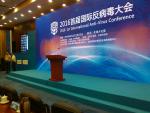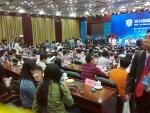Gallery
 Tianjin Grand Hall hi-res
Tianjin Grand Hall hi-res 2016 1st International Anti-Virus Conference Stage hi-res
2016 1st International Anti-Virus Conference Stage hi-res 2016 1st International Anti-Virus Conference Audience hi-res
2016 1st International Anti-Virus Conference Audience hi-resFirst published: 27th September 2016
China's National Computer Virus Emergency Response Centre (CVERC) held the 2016 1st International Anti-Virus Conference on 22 and 23 September in Tianjin. Law enforcement, foreign experts, academics and anti-virus developers spoke to an audience of over two hundred at the Tianjin Grand Hall (天津大礼堂).
The Tianjin Vice Major welcomed the participants and introduced the 600 year old city as a centre for manufacturing and river transport. Lu Ming, the Deputy Director of the State Administration of Foreign Experts Affairs spoke about the importance of information security for the country's development, China's cyber-security framework and the theme of the conference: Sharing, Innovation, Breakthrough. Leaders from the Ministry of Industry and Information Technology and the Office of the Central Leading Group for Cyberspace Affairs explained the size of the problem, its international nature and the need for a multi-pronged approach.
Sergey Novikov from Kaspersky Labs classified the problem as a cyber-threat pyramid with three layers. The lowest is garbage and spam, the second is crime and financial fraud and the top layer, only about 1-3% of the total, is nation-sponsored attacks. However, the border between the top two layers is disappearing. He identified Microsoft building a new data-centre just for Windows 10 telemetry as a privacy disaster. Enterprise will see increasing numbers of targetted attacks. Governments will suffer attacks on critical infrastructure, and false flag attacks will be an issue. For protection he advocated, "Education, Education and Education", emphasising the need to educate people, establish processes and implement technology.
Costel Ion from the INTERPOL Global Complex for Innovation (IGCI) in Singapore explained his work in coordinating the identification of cybercrime and criminals and producing actionable reports for national law enforcement agencies. Their major activities include focus on the use of Tor by criminals, Bitcoin analytics and training on the Darknet. Their facilities include a training network of Raspberry Pis to simulate the Darknet.
Liu Xinyun, Director of the Network Security Protection Bureau of the Ministry of Public Security (MPS) explained that the conference was a joint effort of the MPS and the Tianjin Municipality. In previous years they had organised a China National conference on anti virus, but this was the first year it had been broadened into a international conference with the aim of strengthening international cooperation. During the G20 conference in Hangzhou they succeeded in arresting several people for cyber attacks. He emphasised the need for public/private cooperation, a rating system for systems and a comprehensive defence system with new standards.
Ni Guangnan (乐华建) of the China Academy of Engineering, but probably best known as the CTO of ICTC, which became Legend and then Lenovo, talked about the billions of global netizens and IoT devices and the publicity week for national cyber-security. Wu Jiangxing, Director of the China National Cyber Switching System Engineering and Technological R&D Centre said that it was impossible to eliminate vulnerabilities, that China was mainly a victim of cyber attacks because of too many backdoors, particularly hardware backdoors.
Allan Dyer, Chairman of the Association of Anti-Virus Asia Researchers, challenged the conference to secure "Layer Eight", asking, "What are we telling users". Frank Law, Superintendent of the Cyber Security Division of the Hong Kong Police revealed that Hong Kong was the 4th most prolific source of phishing attacks worldwide in 2015. He also highlighted the Anonymous Asia DDoS attacks during the 2014 Umbrella Movement and the Police's annual cyber security workshop.
Chen Jianmin, Executive Director of CVERC highlighted the rise of the importance of App security since 2006, with the current App download market reaching 250 billion Yuan this year. Dennis Batchelder, Head of the Anti-Malware Testing Standards Organization, introduced his organisation and the importance of agreed standards for independent testing of solutions.
Other speakers included Qi Xiandong, CEO of Qihoo 360, Ma Bin of Tencent, Holloy Stewart of Microsoft, Lin Xiaodong of BaiDu, Tony Ning of Asiainfo, Igor Zdobnov of Doctor Web Labs, Christopher Covert of Symantec and Paul Robinson of Intel. Many of these speakers highlighted the current rise of ransomware, the difficulties in detecting and preventing it and the difficulties faced by users in China in obtaining Bitcoins to pay the ransoms.
The second day of the conference split into two streams: Network Threat Management and Mobile Applications.